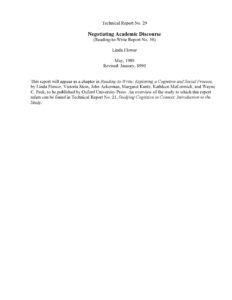Author: Linda Flower
Summary: This report discusses the difficulties experienced by many college freshmen as they seek to negotiate the transition from a writing process based on comprehension and response to a more fully rhetorical, constructive process. Summarizing a series of research studies on student responses to a reading-to-write task, the report concludes that both the deficit model (“lack” of skills) and developmental model (“stages” of growth) are incorrect characterizations of the transition between these two processes. Instead, the report supports a discourse community model, which views students as attempting to negotiate their entry into academic discourse by learning the conventions, expectations, etc. expected by this community. Although this study took place in the 1980s, the report still offers important food for thought as teachers work with students negotiating the academic transition. The report would be useful in contexts related to high school-college transition.
Original Date of Publication: 1990
Excerpt
In order to get a rounded picture of cognition in this academic context, the study looks at the thinking processes of these students from a number of perspectives, drawing on think-aloud protocols of students writing and revising, on interviews with and self-analyses by the students, and on comparisons of teachers’ and students’ perceptions of texts the students wrote. It attempts to place these observations within a broader contextual analysis of the situation as students saw it and the social and cultural assumptions about schooling they brought with them.
What this study revealed were some radical differences in how individual students represent an academic writing task to themselves–differences which teachers might interpret as a simple indication of a student’s ability rather than a student’s interpretation of the task. The students were often unaware that such alternative representations existed or that they might hold such significance. Some images of the task, for instance, such as those dominated by the goals of comprehension, summary, and simple response, offered little or no place for critical response, original synthesis, or interpretation for a rhetorical purpose.
Related Resources
- Promises of Coherence, Weak Content, and Strong Organization: An Analysis of the Student Text
- Are You Ready for College Writing?
- Framework for Success in Postsecondary Writing
Original Source: National Writing Project, https://www.nwp.org/cs/public/print/resource/615
